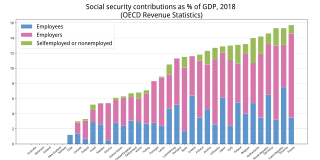Related Research Articles

Workers' compensation or workers' comp is a form of insurance providing wage replacement and medical benefits to employees injured in the course of employment in exchange for mandatory relinquishment of the employee's right to sue his or her employer for the tort of negligence. The trade-off between assured, limited coverage and lack of recourse outside the worker compensation system is known as "the compensation bargain.” One of the problems that the compensation bargain solved is the problem of employers becoming insolvent as a result of high damage awards. The system of collective liability was created to prevent that and thus to ensure security of compensation to the workers.
Unemployment benefits, also called unemployment insurance, unemployment payment, unemployment compensation, or simply unemployment, are payments made by authorized bodies to unemployed people. In the United States, benefits are funded by a compulsory governmental insurance system, not taxes on individual citizens. Depending on the jurisdiction and the status of the person, those sums may be small, covering only basic needs, or may compensate the lost time proportionally to the previous earned salary.

Social insurance is a form of social welfare that provides insurance against economic risks. The insurance may be provided publicly or through the subsidizing of private insurance. In contrast to other forms of social assistance, individuals' claims are partly dependent on their contributions, which can be considered insurance premiums to create a common fund out of which the individuals are then paid benefits in the future.
California's Paid Family Leave (PFL) insurance program, which is also known as the Family Temporary Disability Insurance (FTDI) program, is a law enacted in 2002 that extends unemployment disability compensation to cover individuals who take time off work to care for a seriously ill family member or bond with a new minor child. If eligible, you can receive benefit payments for up to eight weeks. Payments are about 60 to 70 percent of your weekly wages earned 5 to 18 months before your claim start date. You will receive payments by debit card or check. Benefits equal approximately 70% of earnings and have a maximum per week, for a total of up to six weeks.

The Oklahoma Employment Security Commission (OESC) is an independent agency of the state of Oklahoma responsible for providing employment services to the citizens of Oklahoma. The commission is part of a national network of employment service agencies and is funded by money from the United States Department of Labor. The commission is also responsible for administering the Workforce Investment Act of 1998 on behalf of the state.
The Longshore and Harbor Workers' Compensation Act, 33 U.S.C. §§ 901–950, commonly referred to as the "Longshore Act" or "LHWCA" is federal workers' compensation law/act enacted in 1927. Initially, it mandated coverage to employees injured on navigable waters of the United States. Today, it mandates that coverage be provided to certain "maritime" workers, including most dock workers and maritime workers not otherwise covered by the Jones Act. In addition, Congress has extended the LHWCA to cover non-appropriated fund employees, Outer Continental Shelf workers, and U.S. government contractors working in foreign countries under the Defense Base Act This coverage is mandated for all employees, including owners and officers of companies that work in or around navigable waters of the United States.

In California, the Employment Development Department (EDD) is a department of the state government that administers Unemployment Insurance (UI), Disability Insurance (DI), and Paid Family Leave (PFL) programs. The department also provides employment service programs and collects the state's labor market information and employment data. EDD is one of California's three major taxation agencies, alongside California Department of Tax and Fee Administration and the Franchise Tax Board. In addition to collecting unemployment insurance taxes, the department administers the reporting, collection, and enforcement of the state's personal income taxes.
The New York State Department of Labor is the department of the New York state government that enforces labor law and administers unemployment benefits.
The Defense Base Act (DBA) is an extension of the federal workers' compensation program that covers longshoremen and harbor workers, the Longshore and Harbor Workers' Compensation Act 33 U.S.C. §§ 901–950. The DBA covers persons employed at United States defense bases overseas. The DBA is designed to provide medical treatment and compensation to employees of defense contractors injured in the scope and course of employment. The DBA is administered by the United States Department of Labor.
The Maryland Department of Labor is a government agency in the U.S. state of Maryland. It is headquartered at 1100 North Eutaw Street in Baltimore.
Iowa Workforce Development is a government agency in the American state of Iowa, responsible for overseeing workplace safety, workers' compensation, unemployment insurance and job training services. It was formed in May 1996.
The Minnesota Department of Employment and Economic Development (DEED) is the State of Minnesota’s principal economic development agency. Its mission includes supporting the economic success of individuals, businesses, and communities by improving opportunities for growth.

The Georgia Department of Labor is an administrative agency of the U.S. state of Georgia. With approximately 4,000 employees in 2008, it provides services to the state's current and emerging workforce.

The New Jersey Department of Labor and Workforce Development is a governmental agency of the U.S. state of New Jersey. The New Jersey Civil Service Commission is an independent body within the New Jersey state government under the auspices of the department.
The California Labor and Workforce Development Agency (LWDA) is a cabinet-level California state agency that coordinates workforce programs by overseeing seven major departments dealing with benefit administration, enforcement of California labor laws, appellate functions related to employee benefits, workforce development, tax collection, economic development activities. It was conceived by Governor Gray Davis and was formally created by S.B. 1236 in 2002.
The Massachusetts Executive Office of Labor and Workforce Development (EOLWD) is a Cabinet level agency under the Governor of Massachusetts. EOLWD is responsible for enforcing the Commonwealth's labor laws and for providing workforce training to citizens. EOLWD is also responsible for administering Massachusetts' workers' compensation laws, enforcing laws governing collective bargaining, and for providing unemployment benefits to those in need.

The Wisconsin Department of Workforce Development (DWD) is an agency of the Wisconsin state government responsible for providing services to Wisconsin workers, employers, and job-seekers to meet Wisconsin's workforce needs. To effect its mission, the Department administers unemployment benefits and workers' compensation programs for the state of Wisconsin; ensures compliance with state laws on wages and discrimination; provides job resources, training, and employment assistance for job-seekers; and engages with employers to help them find and maintain adequate staffing for their businesses.
The Michigan Department of Labor and Economic Opportunity (LEO) is a principal department of the State of Michigan. The department oversees the state's programs for unemployment insurance, business growth, affordable housing, labor relations, and tourism, among others.

Unemployment insurance in the United States, colloquially referred to as unemployment benefits, refers to social insurance programs which replace a portion of wages for individuals during unemployment. The first unemployment insurance program in the U.S. was created in Wisconsin in 1932, and the federal Social Security Act of 1935 created programs nationwide that are administered by state governments. The constitutionality of the program was upheld by the Supreme Court in 1937.
Unemployment in Hungary measured by the Hungarian Central Statistical Office shows the rate of unemployed individuals out of the labor force. The European Union's own statistical office, Eurostat also makes reports and predictions about the Hungarian job market and the unemployment rate in the country. The KSH's most recent unemployment data shows the unemployment rate for men 15–74 to be 3.3% and 4.1% for women.